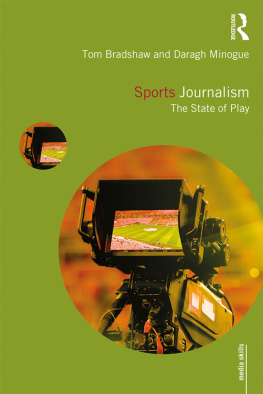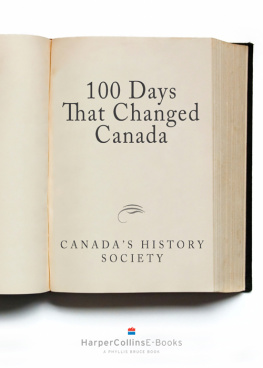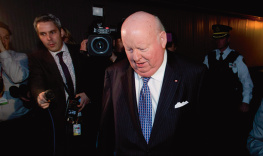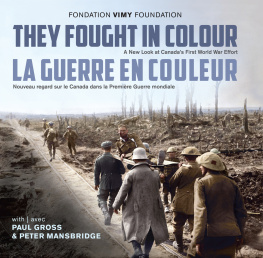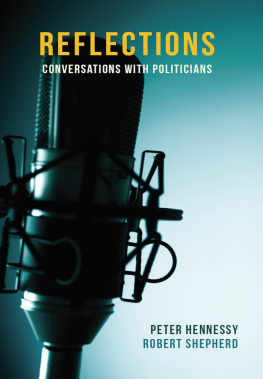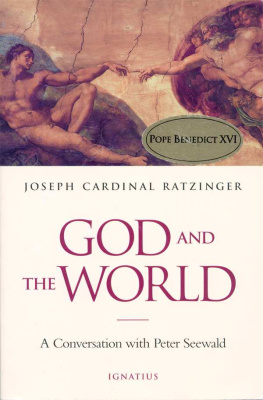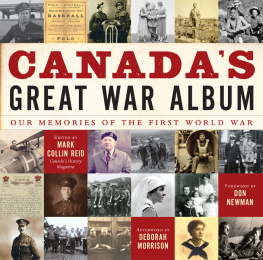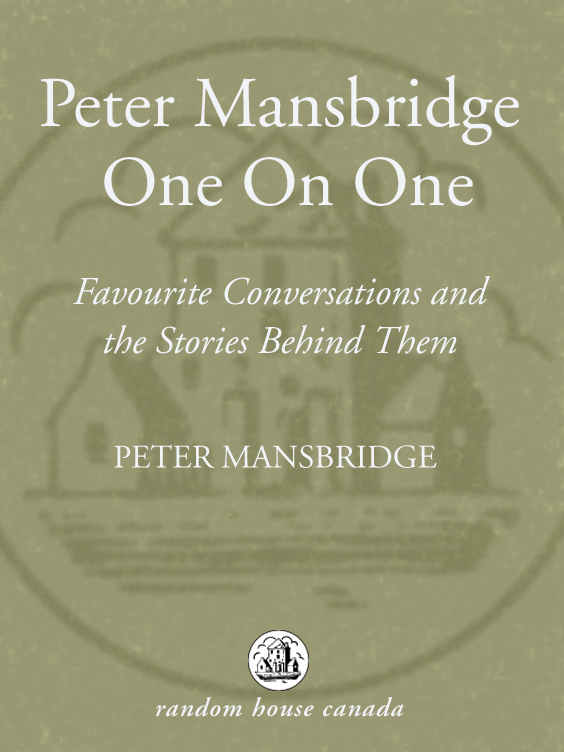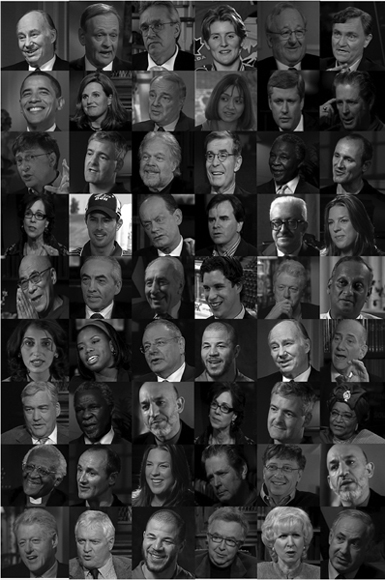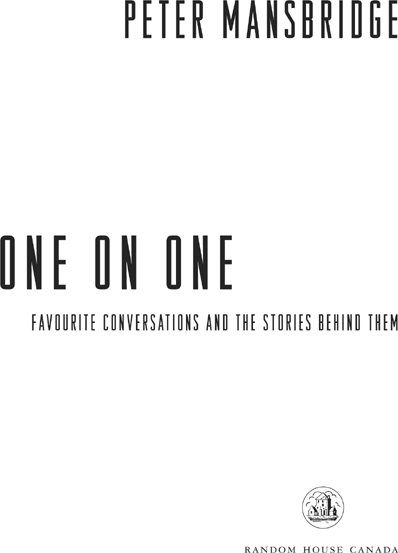ACKNOWLEDGEMENTS
A BOOK LIKE THIS OBVIOUSLY INVOLVES the work of more than just one person, and this is my opportunity to acknowledge those who truly made it happen.
Cynthia Dale and Will Mansbridge allowed me the time to write what I needed to write, and both were never shy about what they thought worked and what didnt.
Leslie Stojsic is the producer of Mansbridge One on One, and from the first hint of this project she has been all over it, chasing down the transcripts and supervising their editing, looking for matching photographs and video images, and always bouncing new ideas off my head (and yes, some of them hurt).
Tony Burman, my former boss at CBC TV News and now the managing director of Al Jazeera English, deserves thanks for allowing me the opportunity to host a program like One on One.
Karen Bower stickhandled the delicate issue of rights at the CBC for both the transcripts and the CBC images that are found on these pages. John Rahme helped with stills and video.
Mark Bulgutch has been by my side on many of the great stories of our time, from the fall of the Berlin Wall to 9/11 and beyond. When Ive needed help with a thought or a word, Mark has always been there, and he didnt let me down on this story either.
Chanel Grist Algie was incredibly patient in dealing with a subject who hates posing for pictures.
Perry Zimel has handled negotiations for my written work in the past and handled this, my first book, and I am greatly appreciative of that.
Anthony Wilson-Smith, a former editor of Macleans, encouraged me to start writing down my experiences and gave me the confidence to believe that a lifelong television journalist can actually wadea tiny bit, anywayinto the waters of print.
And finally, thanks to Michael Schellenberg and Louise Dennys at Random House Canada. Michael cracked the whip and made sure things came in on time and was always ready with an idea or smart criticism. This book was Louises idea: she pitched it to me and was the one who took the gamble on it. The fact that she is now sitting in her office asking What did I do? should not be held against her.
To all, my sincere thanks.
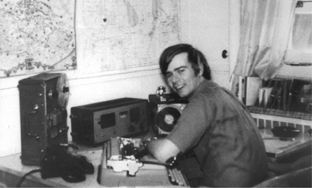
INTRODUCTION
RON FINCH WAS THE FIRST PERSON I ever interviewed. He was a nice fellow: funny, smart and happy in his job. It was the summer of 1969 in Churchill, Manitoba. The summers there are short but theres always lots of action at the grain terminals in the harbour. Finch was the Canada Customs agent monitoring the arrival and departure of foreign ships feverishly taking part in the grain trade. Time was always ticking down on Hudson Bays ice-free days. When the ice returned, the Port of Churchill was shut downthere was no negotiating that fact.
Customs agent Finch had become a friend during that northern summer forty years ago, and our interview was probably one of the worst Ive ever done. And Ive done a lot. Ive lost track of how many there have been since then, and I certainly couldnt name all the people involved (most of them probably cant remember me either). But in my career as a reporter and correspondent for two decades, and as a nightly news anchor for two more, it is probably safe to assume Ive done an average of one interview a day. That begins to approach fifteen thousand interviews. So lets be ultra-conservative and say Ive done around ten thousand. Remembering the first one may sound impressivesomething like an NHL veteran recounting, years after the fact, his every move as he potted his first career goal. But I remember this interview for one simple reason: I was scared silly. As I lugged my heavy, briefcase-sized 1960s portable Nagra tape recorder down to the customs office, I had no idea how to do an interview.
By happy coincidence, it turned out that Finch had no idea how to be interviewed. Thinking back, it was a hilarious scene. We had talked for days about what questions Id ask, what answers hed give, how Id refer to him in my comments, how hed refer to me, how long he should talk, how Id thank him at the end. If that sounds like questionable journalism to you, youre right. Its not supposed to happen that way. But the story had its complications, and in fairness to all, lets step back a bit for some context.
I had arrived in Churchill the year before to work as a ticket agent for Transair, one of the countrys leading regional airlines. I was nineteen and a high-school dropout, and I had just recently left an exciting but relatively unsuccessful stint in the Royal Canadian Navy. The Transair job looked like fun, and it quickly became just that. I was travelling around the West and the North, doing anything and everything that needed doing. I loaded planes and sold tickets. I was once even responsible for keeping the engines warm on an old but pretty reliable four-engine DC-4 that ran supply missions to isolated weather and defence stations in the High Arctic.
Then one day in September, just a few months after I arrived, with a crowded passenger terminal filled with ticket holders anxious to head south, someone asked me to announce the flight. In Churchill that meant heading over to a microphone at the ticket counter, pushing down the Talk button, and rolling out these words: Transair Flight 106 for Thompson, The Pas and Winnipeg is now ready for boarding at Gate One. Passengers travelling with small children and those requiring boarding assistance, please check with the agent at the gate.
Then I was supposed to dash to the gate to be that agent, but before I could get there, someone who had been standing in the crowd cut in front of me. Youve got a great voice, he said. Have you ever thought of being in radio?
And that is how I started working for the CBC . The man in the crowd was Gaston Charpentier, the station manager of CHFC, the tiny CBC Northern Service station in Churchill. The very next night he had me doing the late-night two-hour music show at CHFC. A one-hour training course, a quick tour through the stations selection of 45s and LPs (for younger readers, those were vinyl discs of recorded music that spun around on oh, never mind) and that was thatmy career in broadcasting had begun.
Could that happen today? Sure, just like the Leafs could win the Stanley Cup. When I tell this story to journalism students, they are not amused. These young people have spent thousands of their (or their parents) hard-earned dollars on years of classes hoping, just hoping, to get a shot at the short list for such a job. I explain that, back in those Churchill days, getting someone to move north to be a broadcaster was almost impossible, and if I hadnt said yes Charpentier would almost certainly have moved to the next voice he heard. And so today it might be a former taxi dispatcher or bank teller or telephone operator anchoring The National and writing this book.
Those early months of broadcasting were hit-and-miss for me. Mostly miss. I was no music buff and possessed no sense of what was needed to make a song a hit. During my high school years, in 1963 and 1964, the early years of the British invasion, all my friends insisted that the best British band was the Beatles and that John, Paul, George and Ringo would last forever. I disagreed, and made the case instead for the Dave Clark Five by mimicking their foot-stomping rendition of Glad All Over. (To this day I confess total humiliation about my Beatles myopia. Had I been born in another era I might have thought that Shakespeare was an okay writer, or that that guy Rembrandt could paint some.)


